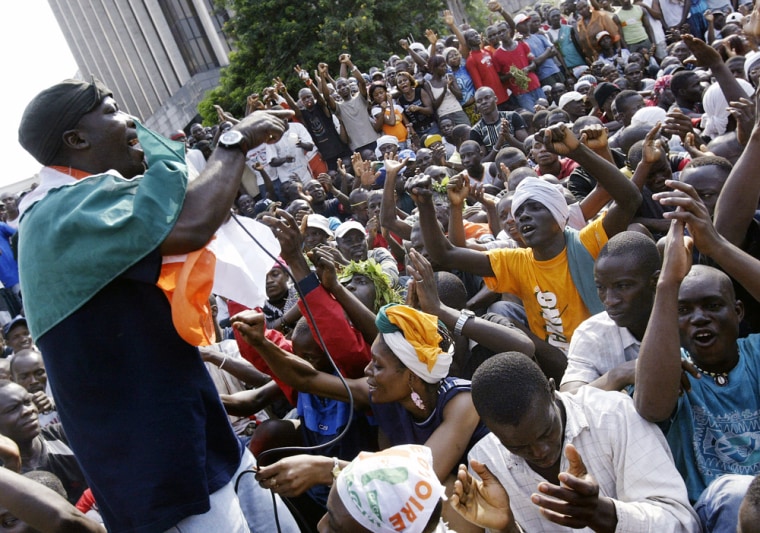Leaders of last month’s fierce anti-U.N. riots in Ivory Coast have shrugged off the sanctions the world body is expected to impose on them on Tuesday, saying the measures will not prevent more street demonstrations.
Youth leaders Charles Ble Goude and Eugene Djue, fiercely loyal to President Laurent Gbagbo, face travel bans and asset freezes after supporters hurled rocks and petrol bombs at U.N. bases in riots last month that left nearly a dozen dead.
The Security Council has approved sanctions on anyone blocking efforts to reunite a country split in two since a brief 2002-03 civil war, but has not yet imposed them on anybody.
But under a four-nation proposal, sanctions will take effect on Tuesday against Ble Goude, Djue and a rebel commander accused of human rights abuses unless any Council member objects first.
May stir more trouble
Some fear the punishment may inflame a volatile situation.
“These sanctions don’t intimidate me at all or lessen my fervor for protests,” Ble Goude, who heads the “Young Patriots” movement, told Reuters by telephone on Monday. However, he told supporters last week not to react when sanctions become active.
Ble Goude and Djue accuse foreign mediators of meddling and infringing Ivory Coast’s sovereignty under a U.N. peace plan to reunite the government-held south and rebel north and hold elections by the end of October.
Both Goude and Djue told Reuters they had no bank accounts to freeze and Djue said he “didn’t care” about a travel ban.
But in the northern rebel-held town of Korhogo several hundred people gathered outside a U.N. base on Monday to demand the U.N. drop proposed sanctions against local rebel commander Fofie Kouakou, who is accused of human rights abuses.
Many analysts say sanctions should have been imposed long ago to speed painfully slow progress towards peace and to end repetitive political deadlocks, on-off violence and human rights abuses that have flourished in a culture of impunity.
Backlash feared
Mike McGovern, West Africa Project Director for Brussels-based think-tank International Crisis Group, told Reuters some backlash was to be expected as the international community began to toughen its stance with the Ivorian factions.
“It’s entirely possible that we will see some flare-ups,” he said. “If (the peace process) is making progress there will be more resistance.”
He said however that foreign mediators needed to maintain pressure on the parties to ensure sanctions were meaningful.
Last month’s riots shook the 7,000-strong U.N. force and peacekeepers have left bases in the volatile west after shooting dead five protestors who tried to steal weapons and vehicles at one base. Some 4,000 French troops are backing up the force.
U.N. needs impose sanctions to preserve credibility
On Monday the U.N. Security Council was due to examine a request by Secretary General Kofi Annan to temporarily transfer 200 peacekeepers and 125 police officers from their mission in neighboring Liberia, in preparation for more violence.
The United States rejected a previous request by the world body’s leader for an extra 3,400 troops as unnecessary but McGovern said the 200 troops, unless they were highly trained quick reaction forces, were unlikely to make much difference.
Observers say the mission had no other choice than to impose sanctions to preserve its credibility, even if it risked provoking reaction from the rival factions in the conflict, who blame each other for the slow pace progress towards peace.
“It’s a learning process. The U.N. understands that not only in Cote d’Ivoire [Ivory Coast] but in Congo, Haiti and other places, they need to deal with this kind of situation,” McGovern said.
